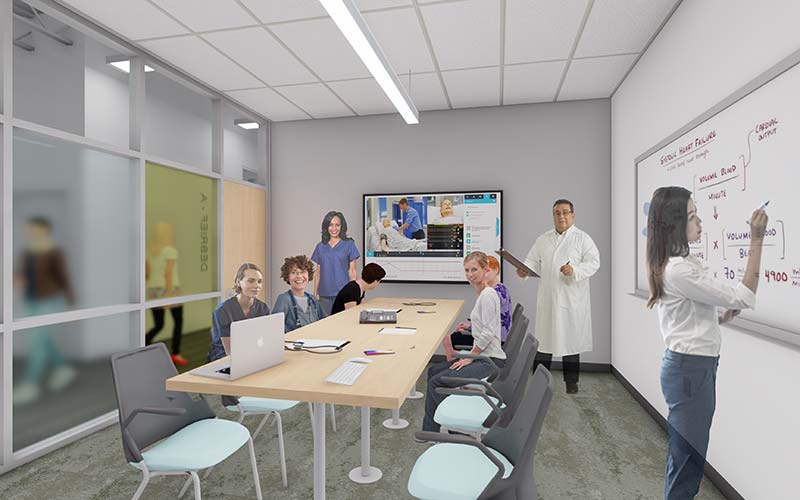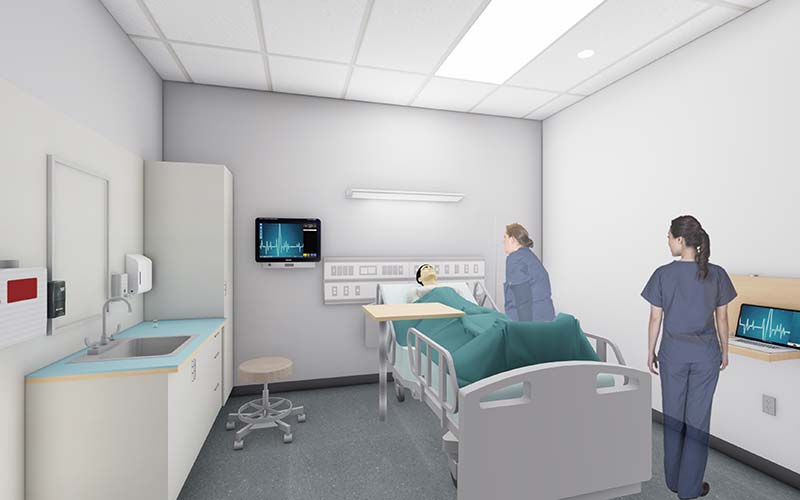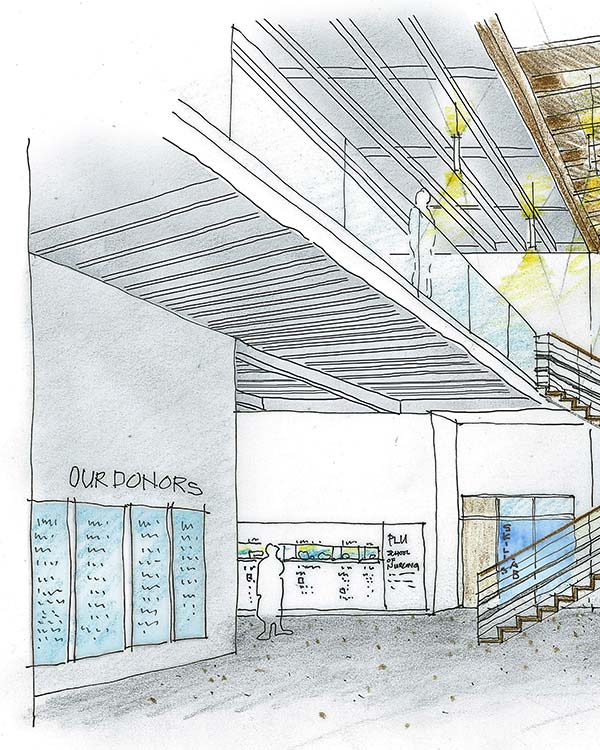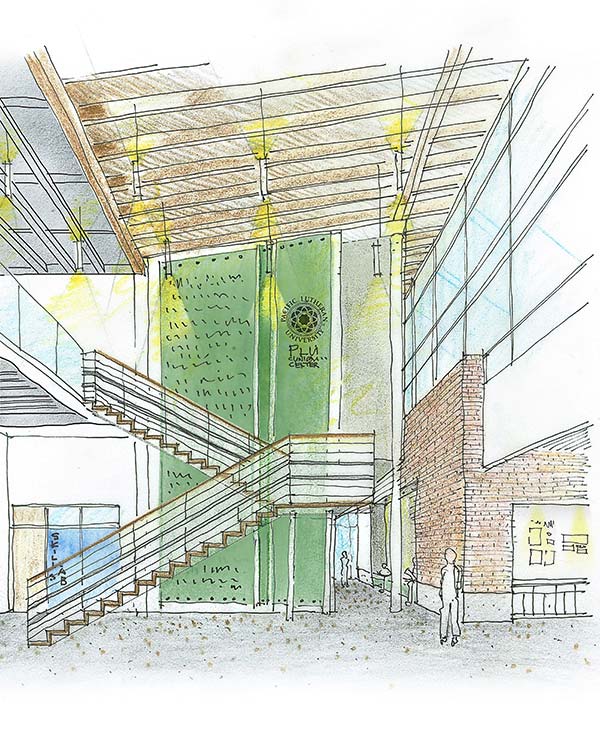Renderings courtesy of McGranahan Architects
Local health care providers say that when they see a PLU degree on a graduate’s resume, they know they’re hiring a great nurse.
For more than 60 years, Pacific Lutheran University has been educating nurses and building a strong reputation as one of the state’s premier nursing education programs.
PLU is already one of the largest producers of nursing graduates in Washington state. And the program is growing. The School of Nursing enrolled nearly 400 undergraduate and graduate students during the 2018-19 academic year, up from just under 350 the previous year.
PLU President Allan Belton says it’s time to match a sterling program with a state-of-the-art facility.
That’s why he’s excited about the planned Clinical Learning and Simulation Center that will double the space available for PLU’s nursing education program as it propels the program into the future.
Contact Kaarin Praxel Austin
253-535-7156
praxel@plu.edu
“We’ve got these talented faculty and they’re attracting amazing students,” Belton said. “But right now, they’re doing so in facilities that don’t match the quality of the program.”
The new center will be located just steps from the main campus, in a building previously occupied by the Garfield Book Company. Preliminary design, engineering and preparation work has been done, and fundraising to support the $6.5 million project is underway. McGranahan Architects is designing the center.
The center will house a state-of-the-art training facility that will include expansive classroom space, a 16-bed inpatient skills lab and additional simulation labs designed to duplicate the kind of equipment and furnishings found in a modern hospital room. They will be equipped with life-like mannequins that replicate patient breathing, pulse, heart sounds and other functions.
Renderings courtesy of McGranahan Architects
“The new labs will allow us to fully integrate and maximize simulations into our graduate and undergraduate curriculum,” said Barbara Habermann, dean of the School of Nursing.
“The center gives students a place to learn and practice nursing skills before they use them in a hospital setting,” said Jodi Kushner, assistant professor and simulation coordinator in the School of Nursing. “The simulation suites will give students more opportunities to learn clinical judgment and critical thinking.”
Currently, the School of Nursing is housed in Ramstad Hall, where a growing number of students can make it a struggle to find adequate classroom space.
“Our classrooms are now at seating capacity,” Habermann said.
The new facility will not only double the available space — from roughly 16,000 square feet to about 32,000 square feet — it will also free up classroom space on the main campus for students in other majors. And locating the center in an existing structure saves on construction costs.
The new classrooms will be equipped with multimedia screens and other instructional technology tools to give students opportunities for more interactive learning. Debriefing rooms will allow students and faculty to review clinical exercises conducted in the simulation lab, and provide immediate feedback.

Clinical Learning and Simulation Center
A drawing of what a new debriefing room could look like.
Clinical Learning and Simulation Center
A drawing of what a new simulation lab could look like.The goal is for PLU’s simulation center to become accredited by the Society for Simulation in Healthcare, which currently lists fewer than 100 accredited centers in the nation.
The concept of training nurses using sophisticated simulation models and equipment grew out of ideas employed in the aviation industry, Kushner said.
Just as commercial pilots train on computer-guided flight simulators, the idea behind the nursing lab is to give students a chance to learn, test and master skills — everything from starting an IV to inserting a catheter — on a mannequin before they encounter human patients.
The simulated patients are incredibly sophisticated. They can register a pulse, and can be programmed to sweat, cry or speak in multiple languages. A “sim-mom” can teach labor-and-delivery skills, while a “sim-baby” can show students how to assess an infant experiencing problems such as respiratory distress.
Faculty will be able to use the new technology to construct scenarios that mimic life-threatening situations, giving students a chance to recognize early signs and symptoms of deteriorating patient health.
“It will give students an opportunity to safely practice and master needed skills before doing them in a hospital setting,” Kushner said. “As students learn more, the simulation scenarios can become more complex and involve more skills. That builds their clinical judgment.”
Experience at other institutions shows that combining the hands-on experience of the simulation lab with expert faculty instruction will improve student outcomes, including pass-rates on nursing license exams – a test where PLU nursing graduates already excel.
Plans for the new facility have already attracted the attention of area health care organizations, who see its potential for training their future work force.
We can become the premier provider of health science education in the South Sound.
- Allan Belton
“The new facility will further position PLU as a regional leader in education for health care professionals,” Belton said. He notes that in addition to a strong School of Nursing, PLU also boasts exceptional programs in kinesiology, social work, marriage and family therapy and more. There’s potential to create ties among those programs, and to create new ones.
“I want us to build on our strengths,” Belton said. “We can become the premier provider of health science education in the South Sound.”
And, Belton adds, PLU’s mission as a liberal arts institution gives graduates more than technical and professional skills.
“We’re producing people who can go out and make a real difference,” he said.



